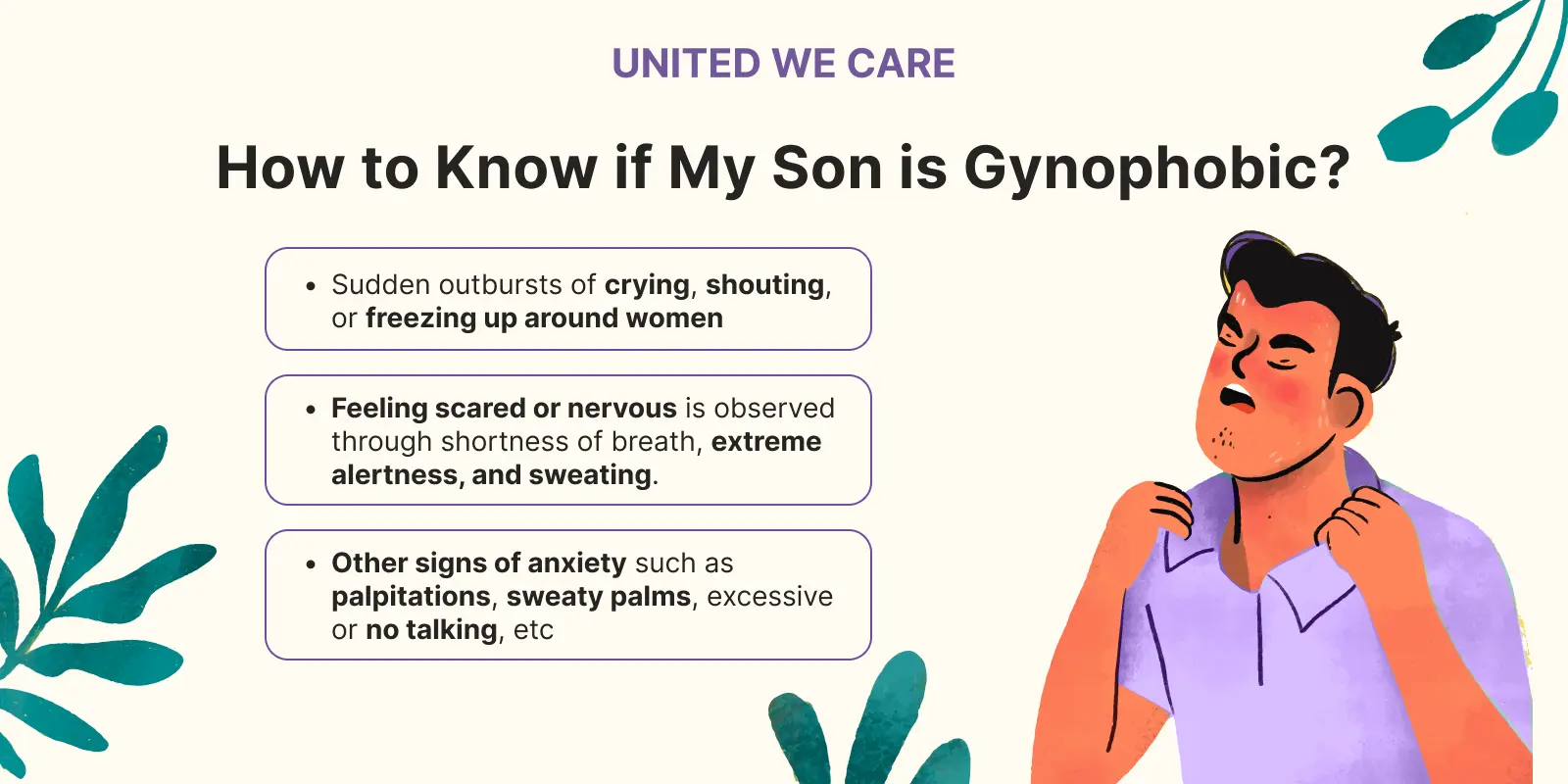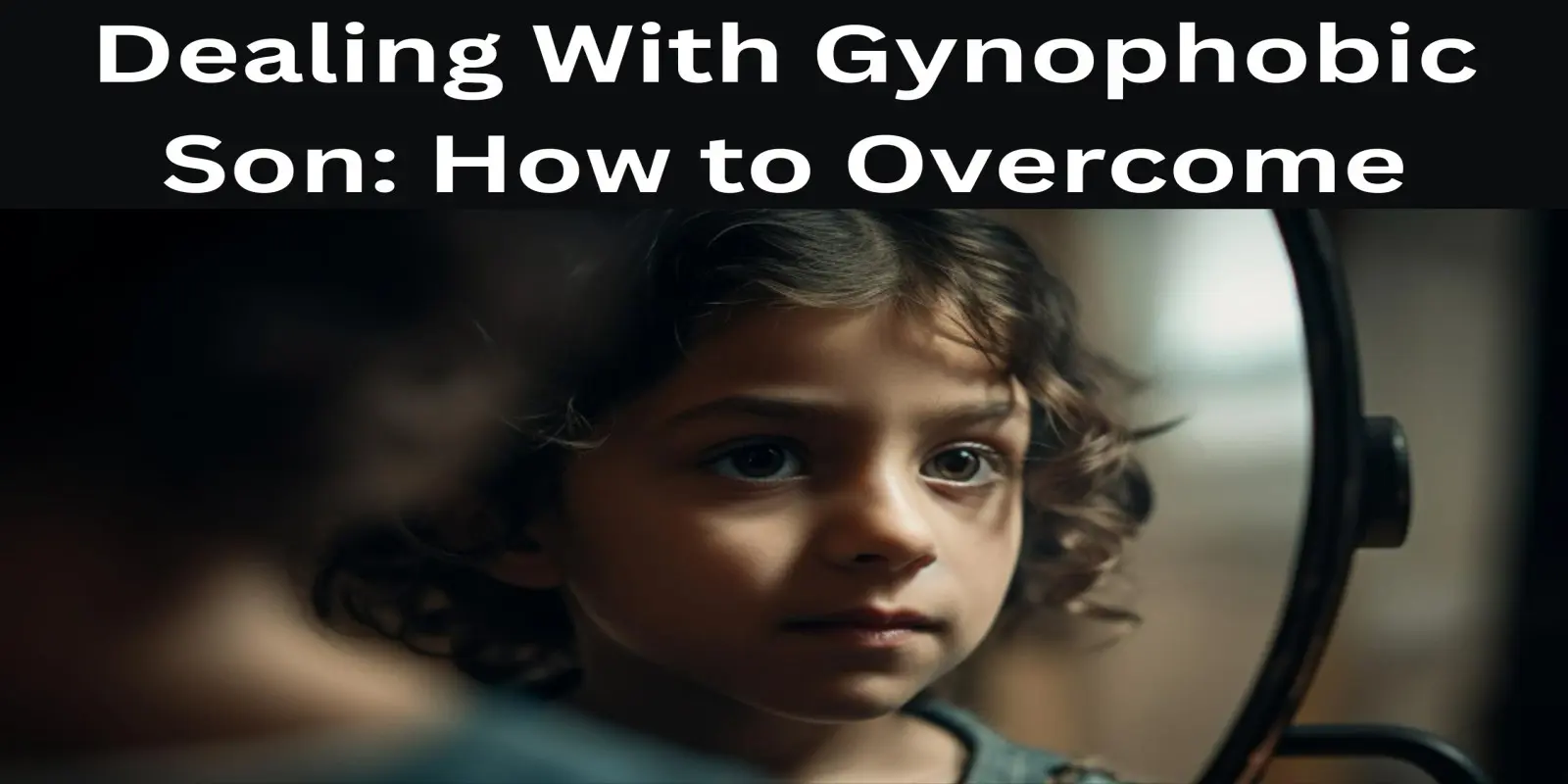Introduction
Essentially, a phobia is a condition where you are afraid or apprehensive of a certain object in the event, even if it doesn’t show any signs of danger. When your son suffers from irrational worries or fears, it can be difficult to ascertain if it’s a phase or a phobia. Especially if your son is fearful of being around women completely, he might be gynophobic.
Gynophobia refers to fear or extreme anxiousness around women.
Let’s find out more about Gynophobia and if your son is gynophobic.
What is Gynophobia?
Namely, phobias are defined by the level of fear caused and the extent to which the fearful object is avoided. A gynophobic will go through extreme measures to avoid being around women. Not only will your gynophobic son experience anxiety when around women. He will make up excuses or react severely when made to be in the presence of women.
Previously, the term ‘Gynophobia’ was known as ‘Horror Feminae’ or the fear of women. While there has been mention of such a fear, there is no formal medical diagnosis for this condition. If your son is gynophobic, it might be difficult to get him diagnosed. This is primarily because gynophobia is not recognized as a formal disorder of phobia in diagnostic manuals.
At best, gynophobia could be given a formal diagnosis within the “specific phobia” category of DSM 5. If you have difficulty knowing whether your son is going to outgrow his gynophobia or needs professional help, medical advice should be sought.
How to Know if My Son is Gynophobic?
Unlike adults, children react differently to negative or threatening stimuli. As a parent or caregiver, it is important to be patient and draw observations of your son’s erratic behavior. There are some signs that you should look for to indicate gynophobia. Here are the signs and possible symptoms to look for:

- Sudden outbursts of crying, shouting, or freezing up around women
- Feeling scared or nervous is observed through shortness of breath, extreme alertness, and sweating.
- Other signs of anxiety such as palpitations, sweaty palms, excessive or no talking, etc
Particularly, the situations in which these signs show up will require the presence of a woman or many women. It is important to remember that these symptoms arise only in the presence of women and subside without them. Only then can the fear be identified as a part of gynophobia.
By and large, these feelings go away as the child becomes more comfortable and grows. However, a gyneophobic son would have several difficulties in day-to-day activities because of the intense fear. In some cases, toughing it out and repeated exposure leads to panic attacks or feelings of being out of control.
Impacts in Daily life of having a Gynophobic Son?
As discussed above, there can be several barriers to the functioning of your son due to his gynophobia.
- It is not necessary that all the areas of functioning are affected; some might be more affected than others. To be specific, situations where interactions with other women are more frequent, regular, or personal.
- Without a doubt, one of the most commonly affected areas of functioning is education or school. A school is a mixed pot of all age groups of people, including women, in the form of teachers and classmates. A gynophobic child will not only have difficulty communicating with female teachers and peers but, in extreme cases, might avoid going to school altogether.
- Similarly, smaller daily household chores such as going to the supermarket or the park become tedious tasks for your son. He goes to extreme lengths to avoid going to public places and is anxious if forced to be accompanied by an adult.
Each child will have varying levels of fear and have different impacts on their functioning and well-being.
Dealing with Gynophobic Son: How to Overcome
Due to the diverse nature of concerns and varying difficulties in life, it is important not to neglect or ignore gynophobia. In many cases, untreated gynophobia translates into adulthood and creates developmental and social delays. For well-being, it is important for the son to have a healthy social life and not feel limited due to gynophobia. Below mentioned are some of the ways to deal with a gynophobic son:
Psychotherapy
As a result of the multifaceted impact of gynophobia, psychotherapy is one of the most effective treatment options available for your son. There are two types of psychotherapy that have shown more effectiveness in treating phobia than others, i.e., Cognitive Behaviour Therapy (CBT) and Exposure Therapy.
Since any phobia is related to fearful thoughts and erratic behavior, CBT helps in reexamining the thoughts and replacing them. This helps change the behavior and reduce fearfulness. Similarly, exposure therapy works on reducing the scary feelings that lead to distress in gynophobia. They work on gradually increasing the intensity of fearful objects until the child becomes comfortable.
Medications
Another possible approach to dealing with gynophobia is through medications. There are no specific medications that are available for gynophobia. However, a trained and experienced psychiatrist will be able to target the origin of the phobia through evidence-based medications for general and specific phobias.
Indeed, it is impossible to reach out to a trained and licensed psychiatrist only for medications. A psychiatrist might prescribe a single dose or a combination of anti-anxiety medication, sedatives, or antidepressants. These medications help in dealing with the neurobiological and physical impact of gynophobia.
Conclusion
Ultimately, gynophobia or the fear of women can have detrimental and negative impacts on your son. It is important to understand the signs and symptoms that your child might be experiencing due to gynophobia. Finally, to learn simple ways to tackle gynophobia read this article.
Most importantly, remember to reach out to a professional expert for an accurate diagnosis. The experts can also guide you towards having better coping skills. To reach out to professionals and guides in one place, connect to United We Care.
References
[1] American Psychiatric Association, “Diagnostic and statistical manual of mental disorders: DSM-5 (5th edition),” Reference Reviews, vol. 28, no. 3, 2013.
[2] L. Winerman, “Figuring out phobia,” https://www.apa.org, Jul. 2005. Available: https://www.apa.org/monitor/julaug05/figuring
[3] R. Garcia, “Neurobiology of fear and specific phobias,” Learning & Memory, vol. 24, no. 9, pp. 462–471, Aug. 2017, doi: https://doi.org/10.1101/lm.044115.116.









